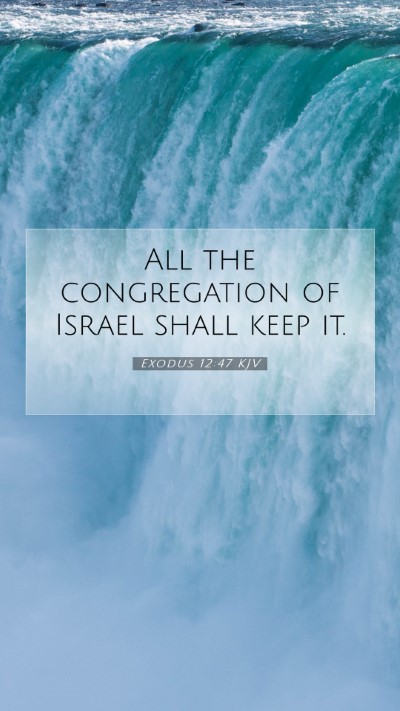Understanding Exodus 12:47
Exodus 12:47 states: "All the congregation of Israel shall keep it." This verse serves as a directive emphasizing the collective participation of the Israelites in the observance of Passover. Public domain commentaries provide various insights into its meaning and implications for both the original audience and modern readers.
Bible Verse Meanings
This verse is pivotal in understanding the institution of the Passover. It highlights the importance of community in worship and obedience to God's commandments.
Detailed Interpretations
- Matthew Henry's Commentary: Henry emphasizes that the Passover was a significant event in Israel's history, marking their deliverance from Egyptian bondage. The use of "congregation" signifies unity and collective responsibility in observing God's ordinances. It illustrates how God desires His people to come together in worship and obedience.
- Albert Barnes' Notes: Barnes points out the inclusiveness of the command, implying that every individual within the community, from leaders to common folk, has a role in this sacred observance. He suggests that this collective participation fosters a sense of identity and belonging among the Israelites as God's chosen people.
- Adam Clarke's Commentary: Clarke notes the historical significance of the Passover in relation to the Exodus narrative. He highlights that this ordinance was not merely a personal mandate but a communal act that reinforced the Israelites' covenant relationship with God. Clarke further explains that keeping the Passover was an act of faith, obedience, and remembrance of God’s mercy.
Collective Obedience and Community
The verse underscores the importance of collective obedience. In ancient Israel, keeping the Passover was more than a ritual; it was a corporate act that bound the nation together in their shared history and faith. This principle of communal worship is still relevant in today's Bible study groups and online Bible study, where believers gather to understand Scripture and grow in faith together.
Biblical Exegesis and Historical Context
To fully grasp the implications of Exodus 12:47, it is essential to consider its historical context. The Passover was instituted during the last plague in Egypt, marking the deliverance of the Israelites from slavery. The blood of the lamb, applied to the doorposts, symbolized protection from judgment. Every household that participated in the Passover meal was a testament to faith and obedience, securing their place within the covenant community.
Significant Themes
- Covenant Relationship: The Passover represents the covenant between God and Israel.
- Deliverance: It signifies God's power to save His people from oppression.
- Remembrance: Keeping the Passover encourages remembrance of God's past faithfulness.
Application of Scripture
Understanding Exodus 12:47 is vital for applying biblical principles to daily life. We are reminded of the importance of community and collective worship in our spiritual practices. Observing rituals, whether through church services or shared Bible studies, can enhance our faith experiences. This verse challenges believers to actively participate in their faith communities.
Bible Study Insights
As you explore the meaning of this verse, consider the following questions for discussion in Bible study lessons or groups:
- What does it mean to be part of a faith community?
- How can we ensure that we embody the principles of Exodus 12:47 in our current practices?
- In what ways do communal acts of worship fortify our faith journey?
Related Bible Verses
Exodus 12:47 can also be understood in the light of several related scriptures:
- Exodus 12:3: This verse discusses the instructions for selecting the Passover lamb.
- 1 Corinthians 5:7: Paul identifies Christ as our Passover lamb, emphasizing the fulfillment of this Old Testament event.
- Hebrews 11:28: This verse speaks to the faith of the Israelites in observing the Passover.
Conclusion
Exodus 12:47 is a call to collective worship and remembrance of God's deliverance. Through various commentaries, we gain insight into its significance, promoting an understanding that transcends the ancient context to address contemporary faith experiences. Engaging deeply with scripture through Bible study resources and Bible study tools allows believers to cultivate a richer, more communal spiritual life.
Final Reflection
As you reflect on Exodus 12:47, consider how you might better engage with your local congregation or study groups. What steps can you take to deepen your involvement in your faith community while obeying God's commands? Let these insights lead to a flourishing spiritual journey filled with understanding and practice.


